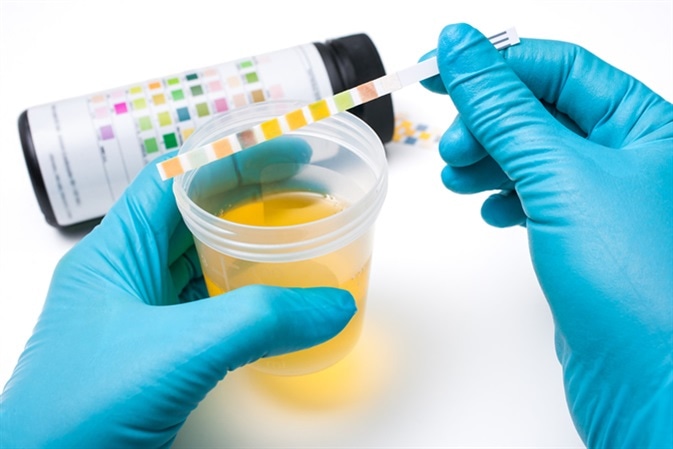Urine is a liquid waste material produced in and excreted by the body. Secreted by the renal tubules, it accumulates in the urinary bladder and is excreted via the urethra. While it is composed of 91 to 96 percent water, it contains many other components, both solid and liquid.

Check-up. Medical report and urine test strips - Image Credit: Alexander Raths / Shutterstock
Urine Osmolarity
The urine osmolarity is a way to assess the concentration of the urine and may vary between 50 and 1200 mOsmol/kg. on average, urinary solute comes to about 1000 mOsmol/ day, with approximately 1.4 liters of urine being secreted per day. The amount and concentration of urine varies with the level of exertion, the environment, the level of hydration, and the intake of salt and protein. The solute concentration is higher in meat-eaters, because of the large amount of urea obtained from meat, whereas lower solutes are formed in vegetarians who get most of their energy from carbohydrates.
Urinary Physical Characteristics
- The pH of urine is normally around 6.2 with a range of 5.5–7.0. A high dietary protein and alcohol intake leads to lower pH, while vegetables and fruit bring about a more alkaline pH.
- The specific gravity of urine may range from 1.002 to 1.037.
- The mean calorific content of urine may be approximately 100 kcal/day.
Urine Composition
Over 99 percent of urinary solutes are composed of only 68 chemicals which have a concentration of 10 mg/L or more. 42 compounds are actually involved. They may be classified as follows:
- Electrolytes such as sodium, potassium, calcium, magnesium and chloride
- Nitrogenous chemicals such as urea and creatinine
- Vitamins
- Hormones
- Organic acids such as uric acid
- Other organic compounds
Total Dissolved Solids
Total dissolved solids in urine constitute between 24.8 to 37.1 g/kg. Urinary solids are primarily made up of organic matter, largely volatile solids. Urine has large amounts of nitrogen, phosphorus, and potassium. Nitrogen content in urine is high, mostly in urea, which makes up more than 50 percent of the total organic acids. This includes urea from protein metabolism, sodium and potassium both of which come from food. Dry solids thus comprise 14-18 percent nitrogen, 13 percent carbon, and 3.7 percent each of potassium and phosphorus. The largest excretion of these substances from the body is through urine.
Nitrogen Excretion
Nitrogen in urine is excreted mostly as urea, with about 11 g per day being the average excretion of nitrogen. It is most significantly affected by dietary protein intake, with a correlation of 0.91 existing between protein in diet and urinary nitrogenous components. About 80 percent of the dietary intake of nitrogen is balanced by the urinary excretion of nitrogenous compounds. Urinary urea concentration ranges from 9 to 23 g/L.
Creatinine is another important nitrogenous compound in urine, and its level depends on the body mass and muscle mass, as well as age. Gender differences may be correlated with these. On average, creatinine production in the body is about 1.6 g/day.
Nitrate is a third nitrogenous compound in urine, with increased concentrations if the person has a high protein diet.
In addition to causing alterations in urinary nitrogen concentrations, protein in diet also affects the levels of other minerals such as phosphorus and potassium. Additionally, an extremely low intake of protein may affect calcium levels.
Calcium in Urine
Calcium excretion is affected by protein intake, as above, and is heavily influenced by sodium excretion. A low sodium diet, therefore, will decrease calcium excretion and vice versa.
A normal urinary sample from an adult collected over 24 hours should receive a calcium level of 100 to 250 mg.
Other Ions
Other less common ionic groups in urine include ammonium, sulfates from amino acids, and phosphates depending on parathyroid hormone levels.
Overall Solute Concentrations
The concentration of the following constituents in urine may be regarded a s a careful approximation:
- Urea: 9.3 g/dL
- Creatinine: 0.670 g/ L
- Sodium: 1.17 g/L
- Potassium: 0.750 g/L
- Chloride: 1.87 g/L
References
Further Reading
Last Updated: Jan 10, 2023